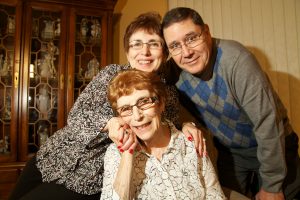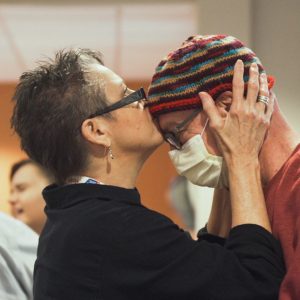Holidays can add stress, worry for caregivers
By Cathy Janek For Chronicle Media — December 24, 2019
While the goal for most families is to keep aging parents and relatives in their home the caregiving that goes along with that is involved and often stressful, in juggling responsibilities and time commitments. That pressure is often magnified at the holiday season. (Photo courtesy of Metropolitan Family Services)
The holidays can be one of excitement and joy, but it also can be one of overwhelming stress.
The additional burden of taking care of a sick family member or friend is only heightened during the holiday season.
Keith Bielema, a transitions coordinator with the Kendall County Health Department who runs a caregiver support group at the Oswego Senior Center, said, “The most important thing we need to learn to do around the holidays is to be flexible.”
“We are pretty flexible about a lot of things in our life,” he added.
However, when it comes to the holidays, “every family or group has their traditions. There is a lot of pressure to keep everything the same, and sometimes that is not feasible” with an ailing family member.
“We also have to be OK with knowing that our emotions are going to go up and down,” he added. “It is hard to not reminisce about what we used to be able to do, and not think about what next year will bring, and enjoy the holiday this year.”
People are good about asking what they can do, Bielema said.
Although it may be difficult, he encouraged those in need to let those who want to help to do so.
The holidays also may “blow into town distant relatives and siblings from out of state who return with a lot of good advice for the caregiver,” he added.
For the person in the trenches 24/7 that can be difficult as well, Bielema said. “Be prepared for well-meaning unsolicited advice.”
Taking care of yourself is the first thing that falls off the table, he said. “If we run out of gas, we can’t give anyone else a ride,”
Bielema often will ask caregivers who come to his group “what did you used to do for fun that you are no longer doing?”
Caregiving can be very isolating, he added. “Getting in the same room with others that are going through similar kinds of dynamics and stresses and struggles can be very supportive for people.”

When a loved one is dealing with a serious illness, such as cancer, much of the holiday season may be spent in hospitals. Health experts say caregivers need to ask others to help care for them and to ask friends and relatives to be understanding of being absent from traditional gatherings. (Photo courtesy of Metropolitan Family Services)
Kathleen Drouin with Metropolitan Family Services agrees.
She has run a caregiver support group in Wheaton for 10 of the 20 years it has been in existence.
Drouin said, “Caregiving is a unique role and it is very challenging. Unless you are another caregiver, people sometimes don’t understand.”
“Fifty to 70 percent of caregivers suffer from clinical depression, because it is just overwhelming,” she added.
For those that can afford paid caregiving assistance, the person in need of care may not want anyone else taking care of them, Drouin said. “Carving out even a half hour a day [for themselves] can be tough.”
“Respite is very important for caregivers, she added. “For some it may be as simple as going to a movie or getting your hair done.”
Unfortunately, “it is not uncommon for the caregiver to predecease the care recipient because of the stress and exhaustion,” Drouin said.
For those that cannot get out, organizations like AARP sponsor an online caregivers support group, she added.
Regarding the holidays, Drouin said, “stating up front how long you will be visiting can set everyone’s expectations—which can be difficult for adult children to hear.”
The same goes for cutting back on gift giving.
“We don’t want to hurt people’s feelings, but there is nothing wrong with making it work for you,” she added.
About 85 percent of long-term care services of adult family members and friends is provided by unpaid caregivers, according to according to Colette Jordan, a community planner with Age Guide Northeastern Illinois, a nonprofit that serves as the funding agency for eight caregiver counseling and resource centers that serves about 650,000 adults age 60 and older.
That figure would equally add an estimated $45 to $90 billion annually in paid services in the United States, she added.
These people can be a good friend, neighbor, daughter, sibling, spouse, or grandchild, Jordan said.

Attending local support groups for caregivers can help in sharing experiences and learning ways to cope with stress and other feelings. Check with your local health department or ask your healthcare provider. See also our listings with agencies in the area. (Photo courtesy of seniorconcerns.org)
Age Guide Northeastern Illinois’ Caregiver Resource Centers are there “in order to keep that family member in their home and community,” she added. “The goal of the program is to help people age in place and not have to go into long-term care.
A big part of our services is respite funding, Drouin added, “It provides an alternative to take a break from caring with options such as home health agency services, adult day services, or short-term nursing facility.”
The Caregiver Resource Centers also provide a stressbusting program for family caregivers.
“It is a nine-week, 90-minute program to help caregivers learn how to care for themselves,” she said. “The program ends with the caregiver making a contract for themselves to stay well and to do things that care for the caregiver and reduce caregiver burnout.”
“The caregivers that have been in my sessions have told me that this program has saved their lives,” she added.
Caregiving and cancer
The American Cancer Society offers these suggestions so you don’t feel overwhelmed and can be at your best to help your loved one:
- Acknowledge that an adult loved one has the right to make decisions about his or her life.
- Whenever possible, offer choices.
- Do only those things your loved one can’t do.
- Be prepared to do what you promise to do.
- Take care of yourself.
- Give yourself a break.
- Remember that your family is your first resource
Gifts for Caregivers
The Alzheimer’s Association offers a caregiver holiday guide (https://www.alz.org/help-support/resources/holidays) that shows how, with careful planning, family celebrations can be a meaningful part of the holidays while ensuring safety, comfort and enjoyment for everyone. If you’re still looking for ways to help, here are some year-round gift ideas:
- The gift of time. Cost-effective and truly meaningful gifts are self-made coupons for cleaning the house, cooking a meal, mowing the lawn, shoveling the driveway, and giving time off so a caregiver can do something to meet their needs.
- Gift cards and certificates. Give gift certificates for restaurants, laundry/dry cleaning services, lawn care services, computer/technology support, maid services, and personal pampering services such as massages and pedicures.
- Books. In addition to giving novels on the caregiver’s “must-read” list, there are also a number of books on caregiving.
(Source: Alzheimer’s Association)







